I'm working on an Android project which uses a Java class that is a wrapper on a C++ library. The C++ library is a company internal library and we have access to its source code, but in the Android project it is only dynamically linked, so it is used only in the form of headers (.h) and shared objects (.so). Having access to the library source code, is it possible to specify to Android Studio the path to the source code so I can step inside the library using the debugger?
The debugger works, I can step inside the Java_clory_engine_sdk_CloryNative_nativeInit function, but I would also like to further debug the library corresponding to the Clory::Engine class which, as I mentioned, is an internal library we have source code access to.
For example, Clory::Engine::instance is part of the library and I would like to specify to Android Studio the location of the CloryEngine.cpp file so I can step inside Clory::Engine::instance with the debugger, thus debugging this static member function.
I am using Android Studio 3.1.4.
Is this possible?
EDIT:
The clory-sdk.gradle file specifies the CMakeLists.txt file which configures the C++ layer.
externalNativeBuild {
cmake {
path "CMakeLists.txt"
}
}
So I am using an internal application which uses the Clory SDK. Inside the app.gradle file I use:
dependencies {
...
compile project(':clory-sdk-core')
compile project(':clory-sdk')
...
}
so I don't think we're using the aars for the app.gradle project. The aars are shipped to the client, but we are using app.gradle project to test our little SDK functionalities before doing that. The JNI layer is inside clory-sdk-core project.
EDIT 2:
Here is the CMakeLists.txt which handles the JNI layer:
cmake_minimum_required(VERSION 3.4.1)
set(CMAKE_AUTOMOC ON)
set(CMAKE_INCLUDE_CURRENT_DIR ON)
set(CMAKE_BUILD_TYPE Debug)
add_library(
clory-lib
SHARED
# JNI layer and other helper classes for transferring data from Java to Qt/C++
src/main/cpp/clory-lib.cpp
src/main/cpp/JObjectHandler.cpp
src/main/cpp/JObjectResolver.cpp
src/main/cpp/JObjectCreator.cpp
src/main/cpp/DataConverter.cpp
src/main/cpp/JObjectHelper.cpp
src/main/cpp/JEnvironmentManager.cpp
)
find_library(
log-lib
log
)
target_compile_options(clory-lib
PUBLIC
-std=c++11
)
# Hardcoded for now...will fix later...
set(_QT_ROOT_PATH /Users/jacob/Qt/5.8)
if(${ANDROID_ABI} MATCHES ^armeabi-v7.*$)
set(_QT_ARCH android_armv7)
elseif(${ANDROID_ABI} MATCHES ^x86$)
set(_QT_ARCH android_x86)
else()
message(FATAL_ERROR "Unsupported Android architecture!!!")
endif()
set(CMAKE_FIND_ROOT_PATH ${_QT_ROOT_PATH}/${_QT_ARCH})
find_package(Qt5 REQUIRED COMPONENTS
Core
CONFIG
)
target_include_directories(clory-lib
PUBLIC
${CMAKE_CURRENT_LIST_DIR}/src/main/cpp
)
set(_CLORYSDK_LIB_PATH ${CMAKE_CURRENT_LIST_DIR}/src/main/jniLibs/${ANDROID_ABI})
target_link_libraries(clory-lib
${log-lib}
-L${_CLORYSDK_LIB_PATH}
clorysdk
Qt5::Core
)
The library clorysdk is actually our internal library I was talking about, which contains e.g. Clory::Engine::instance I would like to step into with the debugger. It was built with qmake and is built in debug mode (CONFIG+=debug was added in the effective qmake call).
EDIT 3:
In the LLDB session which has opened after it hit the Java_clory_engine_sdk_CloryNative_nativeInit breakpoint, I got the following:
(lldb) image lookup -vrn Clory::Engine::instance
2 matches found in /Users/jacob/.lldb/module_cache/remote-android/.cache/6EDE4F0A-0000-0000-0000-000000000000/libclorysdk.so:
Address: libclorysdk.so[0x0001bb32] (libclorysdk.so..text + 8250)
Summary: libclorysdk.so`Clory::Engine::instance(Clory::Engine::Purpose)
Module: file = "/Users/jacob/.lldb/module_cache/remote-android/.cache/6EDE4F0A-0000-0000-0000-000000000000/libclorysdk.so", arch = "arm"
Symbol: id = {0x0000005e}, range = [0xcb41eb32-0xcb41ebc0), name="Clory::Engine::instance(Clory::Engine::Purpose)", mangled="_ZN4Clory2Engine8instanceENS0_7PurposeE"
Address: libclorysdk.so[0x0001b82c] (libclorysdk.so..text + 7476)
Summary: libclorysdk.so`Clory::Engine::instance(Clory::RuntimeConfiguration const&, Clory::Engine::Purpose)
Module: file = "/Users/jacob/.lldb/module_cache/remote-android/.cache/6EDE4F0A-0000-0000-0000-000000000000/libclorysdk.so", arch = "arm"
Symbol: id = {0x000000bd}, range = [0xcb41e82c-0xcb41e970), name="Clory::Engine::instance(Clory::RuntimeConfiguration const&, Clory::Engine::Purpose)", mangled="_ZN4Clory2Engine8instanceERKNS_20RuntimeConfigurationENS0_7PurposeE"
(lldb) settings show target.source-map
target.source-map (path-map) =
First of all, there was no CompileUnit section in the result of the command image lookup -vrn Clory::Engine::instance. How is this possible to have no source-map defined(second lldb command) if the libclorysdk.so was built in Debug mode? Is it possible to explicitly set it so that the debugger would search there for the library's source files?
EDIT 4:
After searching more I found out that the process of creating the APK actually strips the *.so libraries from their debugging symbols. libclorysdk.so built in debug mode has about 10MB while the libclorysdk.so file which I extracted after unarchiving the generated *.apk file is just 350KB.
As stated here, running greadelf --debug-dump=decodedline libclorysdk.so on the debug version outputs references to the source files, but if the command is run on the *.apk extracted library, it outputs nothing.
Is there a way to stop Android Studio from stripping the *.sos? I tried How to avoid stripping for native code symbols for android app but didn't have any effect, *.apk file is the same size as before and debugging the native libraries still doesn't work.
I'm using Gradle 3.1.4.
EDIT 5:
The stripping solution works, but in my case, it needed a Clean & Build before hitting the breakpoints in the library. Deploying *.sos which are not stripped is allowing you to have debugging sessions and step inside the native libraries.
Note:
If the libraries are built using the Qt for Android toolchain, the *.sos deployed to $SHADOW_BUILD/android-build are also stripped(where $SHADOW_BUILD is the build directory usually starting with build-*). So in order to debug those you should copy them from outside the android-build directory where each *.so is generated.
